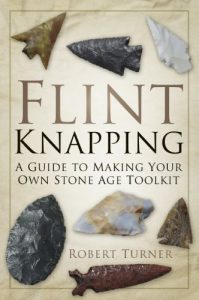Flint knapping, which is the shaping of flint or other fracturing stone to manufacture tools, was one of the primary skills used for survival by our prehistoric ancestors. Early mankind once made and used these implements on a daily basis to hunt, prepare food and clothing, to farm, make shelters, and perform all the other tasks required for Stone Age existence.
A material that has been with us since earliest times, flint still plays a part in our lives today: it is used in cigarette, gas and barbeque lighters; in some parts of Britain it is a major building material; and many of our beaches have shingle which is just flint by another name.
In this informative and original guide, expert Robert Turner explains how flint was used, what tools were made and what they were made for, and provides detailed instruction of how to make them, enabling the reader to replicate their own Stone Age toolkit. Illustrated throughout, Flint Knapping is a journey of archaeological discovery through the Palaeolithic, Mesolithic, Neolithic and Bronze Ages.
A material that has been with us since earliest times, flint still plays a part in our lives today: it is used in cigarette, gas and barbeque lighters; in some parts of Britain it is a major building material; and many of our beaches have shingle which is just flint by another name.
In this informative and original guide, expert Robert Turner explains how flint was used, what tools were made and what they were made for, and provides detailed instruction of how to make them, enabling the reader to replicate their own Stone Age toolkit. Illustrated throughout, Flint Knapping is a journey of archaeological discovery through the Palaeolithic, Mesolithic, Neolithic and Bronze Ages.






